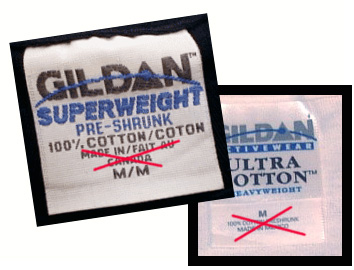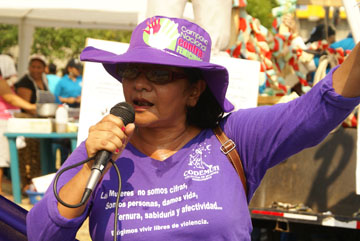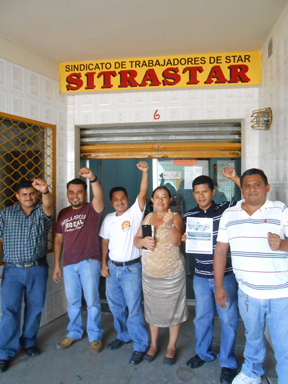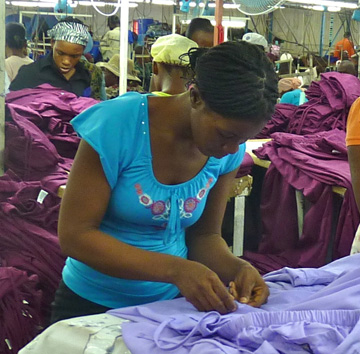WELCOME TO THE ARCHIVE (1994-2014) OF THE MAQUILA SOLIDARITY NETWORK. For current information on our ongoing work on the living wage, women's labour rights, freedom of association, corporate accountability and Bangladesh fire and safety, please visit our new website, launched in October, 2015: www.maquilasolidarity.org
Between 2001 and 2013, MSN and our Southern partners and Northern counterparts were involved in a number of campaigns and efforts to engage with Gildan Activewear about specific cases of worker rights violations, as well as the impact of its production practices on workers’ health.
Gildan Activewear is a vertically integrated Canadian-based marketer and manufacturer of basic apparel including t-shirts, socks and underwear.
Unlike many apparel manufacturers, most of Gildan's products are made in its wholly owned facilities, where they employed approximately 34,800 workers in 2013. Gildan is one of the few large apparel companies whose supply chain is concentrated in the Americas - primarily in Honduras, Nicaragura, Haiti and the Dominican Republic. Gildan also owns and operates yarn spinning facilities in the US and one garment factory in Bangladesh.
Gildan is a Participating Company in the Fair Labor Association (FLA). In June, 2007, its code of conduct compliance program was accredited by the FLA.
When Gildan Activewear announced the closure of two of its factories in the State of Coahuila in northern Mexico last March, workers had reason to be worried. But after a series of discussions with MSN and the local labour rights organization SEDEPAC, Gildan has set a precedent for workers who are used to being denied even their legal entitlements.
 Canadian t-shirt manufacturer Gildan Activewear is closing two factories in Mexico, two Montreal textile plants and a cutting operation in New York. An estimated 1,365 Mexican and 465 Canadian and U.S. workers will be laid off. Workers at the Mexican factories were particularly hard hit, as the region is already reeling from Hanesbrands' laying-off of 1,700 workers in December 2006. With MSN’s assistance, our local Mexican partner organization in Monclova, SEDEPAC, put forward a series of proposals to Gildan.
Canadian t-shirt manufacturer Gildan Activewear is closing two factories in Mexico, two Montreal textile plants and a cutting operation in New York. An estimated 1,365 Mexican and 465 Canadian and U.S. workers will be laid off. Workers at the Mexican factories were particularly hard hit, as the region is already reeling from Hanesbrands' laying-off of 1,700 workers in December 2006. With MSN’s assistance, our local Mexican partner organization in Monclova, SEDEPAC, put forward a series of proposals to Gildan.
 Two complaints about the impact of high production targets and long work shifts on women workers’ health has exposed the limitations of existing multi-stakeholder code monitoring initiatives.
Two complaints about the impact of high production targets and long work shifts on women workers’ health has exposed the limitations of existing multi-stakeholder code monitoring initiatives.
 When Canadian T-shirt manufacturer Gildan Activewear purchased Anvil Knitwear in May 2012, workers at Anvil’s unionized Star factory in El Progreso, Honduras were understandably worried about their job security. After all, Gildan was the same company that had closed a wholly-owned factory in El Progreso eight years earlier in order to avoid having to accept and negotiate with a union.
When Canadian T-shirt manufacturer Gildan Activewear purchased Anvil Knitwear in May 2012, workers at Anvil’s unionized Star factory in El Progreso, Honduras were understandably worried about their job security. After all, Gildan was the same company that had closed a wholly-owned factory in El Progreso eight years earlier in order to avoid having to accept and negotiate with a union.

In February 2011, the Honduran Women's Collective (CODEMUH) filed a complaint with the Fair Labor Association (FLA) alleging that 57 workers at Honduran factories owned by Canadian t-shirt manufacturer Gildan Activewear had suffered debilitating injures due to long work shifts, the intense pace of production and high production targets.
 Shortly after a new union was formed last September in Haiti's growing apparel manufacturing sector, six of the seven workers who serve on the union's executive committee were fired or forced to resign by the factories where they worked. But we're pleased to report that thanks to concerted efforts by Haitian and international labour rights groups, all but one of the workers have now been reinstated and are back at work.
Shortly after a new union was formed last September in Haiti's growing apparel manufacturing sector, six of the seven workers who serve on the union's executive committee were fired or forced to resign by the factories where they worked. But we're pleased to report that thanks to concerted efforts by Haitian and international labour rights groups, all but one of the workers have now been reinstated and are back at work.
The apparel industry was widely hailed in some circles as a vital economic opportunity for Haiti, particularly after the devastating earthquake which hit the country in January 2010. Although the creation of approximately 26,000 jobs in the country is certainly welcome, the full benefits of those jobs will only be felt if the workers have access to their legal rights, including the right to form unions and bargain collectively, and are paid a living wage.